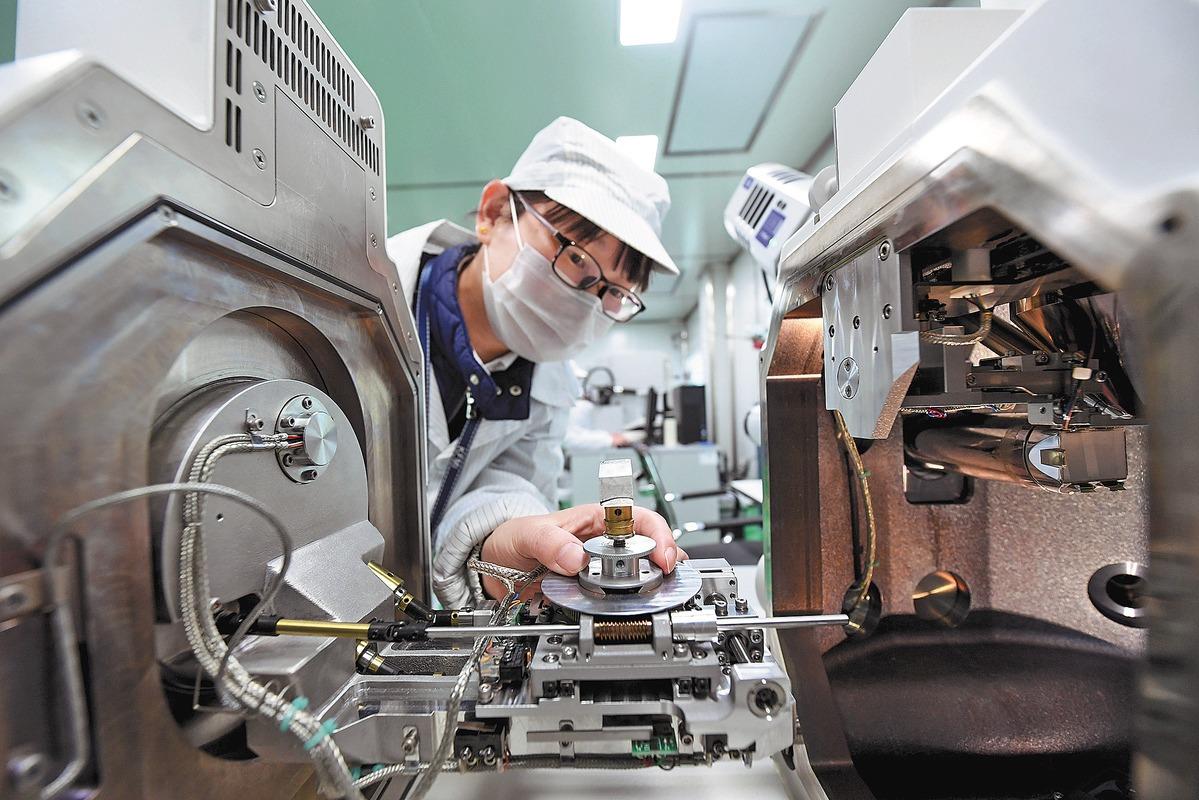Pessimistic views about Beijing economy exaggerated and biased, economists say
 A staff member inspects raw material used in chip manufacturing at a testing center of an electronics firm in Ningbo, Zhejiang province, on March 21. (PHOTO / XINHUA)
A staff member inspects raw material used in chip manufacturing at a testing center of an electronics firm in Ningbo, Zhejiang province, on March 21. (PHOTO / XINHUA)
The recent pessimistic views about China's economic outlook are exaggerated and biased amid rising anti-China sentiment, said two economists, who highlight alternative energy, electric vehicles and tech sectors as strengths of the economy.
When looking at China's slowing trend of growth, "today's fashionable pessimism" ignores or underestimates the intrinsic strengths of the Chinese economy, which is "flexible and dynamic", as its alternative energy, electric vehicles, data analysis and high-tech sectors remain its strengths, said Larry Hatheway, co-founder of Jackson Hole Economics, and former chief economist of UBS Investment Bank.
"In some cases, such as solar panels, Chinese firms are world leaders. In other areas, such as EVs, China is making impressive strides," Hatheway said.
"It is difficult to imagine any economy achieving high and sustainable growth rates over the next quarter century without the development, adoption and transition to clean energy usage, transmission and storage being part of that story," he said.
"Clearly, a major challenge for China and for all countries is to transition from greenhouse gas emitting energy sources or uses to alternatives without, however, sacrificing growth and rising living standards," Hatheway said. "That necessity is spawning vast new industries in energy development, transmission and storage."
Another key strength is the "vast pool of existing human capital — Chinese universities produce more engineers annually than any other country", said Hatheway.
The number of engineers graduating from Chinese higher education institutions reached 1.4 million in 2021, according to Statista, a global data platform.
"History strongly suggests that education plays a pivotal role in determining China's sustainable growth rate over the next few decades," Hatheway said. The fact that Chinese universities are producing a large number of students in STEM disciplines, including engineering, is a distinct advantage, he said.
Other intrinsic economic strengths of China include "an enormous domestic market", "access to global markets via supply chains for trade and finance", and "market-based economic dynamism", according to an article by Hatheway posted on his organization's website.
Investment destination
"Having the world's second-largest national economy as well as access to global trade and finance makes China an exceedingly attractive place for investment and innovation. China also offers a well-diversified economy. It is not overly reliant on a single product, market, or industry," he said in the article.
The most underestimated factor by pessimists is their failure to account for market forces in China's development, said Hatheway, citing World Bank data that State-owned enterprises represent about one-quarter of China's output, with the private sector dominating production.
Any analysis of China's medium-term growth prospects is incomplete without noting those strengths, he said.
Ruchir Sharma, chair of Rockefeller International, also stressed the strengths of tech and electric vehicle sectors in China's economy.
"The case for a bounce back rests in part on China's tech prowess," wrote Sharma in an article published by the Financial Times recently.
He cited a study by the Australian Strategic Policy Institute earlier this year which found China had a "sometimes stunning" lead over the United States in 37 of 44 tech fields, from artificial intelligence to robotics.
"This year, China surpassed Japan as the world's leading exporter of EVs, which are also among the brightest spots in the Chinese stock markets," he said.
"Despite a rough second quarter, the markets showed pockets of resilience with revenue growth rising in consumer sectors such as autos and leisure; even where company results weren't great, they were at least no longer falling short of the much-lowered expectations," Sharma said.
"Yet, given that anti-China sentiment is so high, ideological blinkers may be preventing commentators from seeing anything positive," he said.
Hatheway shared similar observations.
"These days, intense competition has arisen over who can trash China's economy the most," he said. "But sometimes the search for truth requires us to ward off hype, exaggeration and bias."


